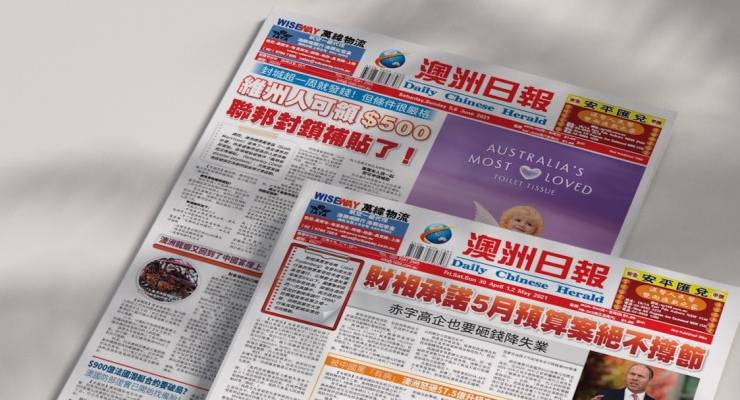
I was recently startled to hear a report that China was in the business of buying up Australian news organisations and requiring them to adopt pro-Beijing editorial policies. University of Southern California Annenberg School for Communication and Journalism emeritus Professor Philip Seib was being interviewed for ABC Radio National, and he now had my full attention.
Interviewer Julian Morrow introduced Seib as the “world’s leading expert” on media and war, and the focus of the interview was the expanding threat of information warfare, following the publication of Seib’s new book.
Russia and China are the nations most culpable of disinformation, according to Seib, and the Chinese are “very ambitious” to take hold of the world stage. Pressed for more details about China’s media ownership in Australia, Seib claimed that Beijing has resorted to “purchasing news organisations” and “putting in editorial policy that is more favourable to Beijing” in Asia-Pacific countries, including Australia. As a result, “many” Chinese-language news organisations are soft on the “Beijing regime”.
As a media academic who has spent the last five years researching Chinese-language media in Australia, I was astonished to hear Seib’s claim about the level of Chinese influence. His finding was certainly at odds with my own research data.
Keen to know the source of Seib’s information, I emailed him. He sent me the Reporters Without Borders report on which his claim was based, which asserts that “Beijing is said to have infiltrated 95% of the Chinese-language newspapers” in Australia. The report didn’t provide a source for that figure, and it didn’t mention Beijing “purchasing” these newspapers.
My mild concern with Seib’s claim now turned to alarm. How could I have missed such crucial data? Being a pedantic researcher, I went down an academic rabbit hole in search of the source of the staggering 95% claim. After much digging, I found that the figure had appeared in an online Chinese-language article published in 2016 by New Tang Dynasty Television (NTDTV), a global Chinese-language media company based in the United States. According to an interview with company president Zhong Lee it was founded and run by Falun Gong practitioners.
The NTDTV article in turn cited a Sydney Morning Herald story which says “nearly 95% of the Australian Chinese newspapers have been brought in by the Chinese government to some degree”, quoting an anonymous editor who works at a “pro-Chinese government publication in Australia”.
Given the eye-watering and seemingly precise nature of the figure, it is astonishing that the SMH journalists did not ask the anonymous source how they arrived at this figure. What was the size and scope of the source’s sample? Did the research focus on print media alone, or did it take into account digital Chinese-language media which, by 2016, were already threatening the survival of Chinese-language newspapers?
And most importantly, in exactly what way have these news organisations been “brought in” by the Chinese government’?
I became more concerned when I realised that the SMH story had appeared just two months before I published a report on Chinese-language media in Australia that painted a much more complex picture about Australia’s Chinese-language media landscape.
I recount this anecdote here as an example of how current public knowledge of Chinese influence is produced, involving the participation of English-language mainstream media such as the SMH and ABC, reputable scholars such as Philip Seib, prestigious scholarly institutions such as Annenberg, globally recognised NGOs such as Reporters Without Borders, and Falun Gong-funded Chinese-language outlets such as NTDTV.
While I reached an “anonymous” dead end in my attempt to get to the bottom of the 95% figure, what I did find from this source-excavating exercise was almost literally a series of Chinese whispers — a process involving the eager but often unwitting input of scholars, reporters, media organisations and NGOs with a specific, if perhaps unconscious, political agenda. It is a process whereby sensationalism feeds on ignorance and preys on credulity.
Standing alone, the claim made by the SMH was already on shaky ground, lacking in rigour, accuracy, precision and nuance. But more worryingly, it ended up becoming the source of a vicious cycle of “knowledge” production, whereby each time the figure was quoted, the narrative underwent a round of simplification, generalisation and distortion.
At no point was the basis of the evidence verified, the validity of the claims examined, the credibility of the source questioned, or the truth status of the claim challenged.
This kind of vicious cycle is something we are seeing too often in the Australian media’s construction of Chinese influence and the China threat. If this is the level of rigour and credibility in the media’s coverage of Chinese-language media, what can we expect of its coverage of other domains of alleged Chinese influence? Spare a thought for Radio National listeners, SMH readers and the great majority of the English-speaking mainstream public. This is their staple diet of China-related media content, and yet, prima facie, most people see no reason to question what they read or hear.
Goaded by this sense of unease about mainstream reporting on Chinese-language media, I decided to publish a series of five public-facing articles over the last couple of months, as well as give a public talk, “Inside the ‘black box’ of Chinese-language media in Australia”.
I’m aware that my critiques of the Australian media’s coverage of China-related issues and their representations of Chinese people may simply be, to borrow a metaphor from Paul Keating, “throwing a handful of toothpicks at the mountain” of well-established half-truths that are firmly lodged in the public’s mind about myriad aspects of China.
For several years establishing claims based on statements uttered by sources who cannot be named has been the main journalistic game in town. And there are winners and losers in this game.
To be sure, journalists get their story, publications get their clicks, professors of journalism publish their books, Reporters Without Borders produce their reports in defence of press freedom, and anti-CCP media produce yet more bias-confirming “proof” of Beijing’s infiltration. About this current situation, China Story Blog and China Neican co-editor Adam Ni observed wryly in a private social media group, “Everyone benefits, except for the public, except for Chinese Australians”.
This story of Chinese whispers invites a fundamental question that has become too urgent for the Australian media to ignore: what is the role of the Australian media, especially news media, in shaping a sense of who we are as a nation, amidst talk of a Cold War with China? How do these media produce public knowledge about a country that is increasingly imagined as our strategic enemy?
Who calls the shots when it comes to truth claims about Chinese influence in Australia? I hope to address some of these questions in a forthcoming public lecture.








China no threat. UKUS is threat. Our own government is threat. Give long hard look, you see. As Goering said, If you want to start a war tell the people there is a threat. This government knows that, feeling threatened, people will vote for the status quo. So pinheads like Dutton tell us there’s a threat, for votes, blind to the fact that he’s whistling up war also. If he truly believes that war with China would end well for us he should be locked up in an asylum for the criminally insane, for life. So, yes, he and his fellow fools are a threat to our national security.
Don’t vote for people who make you feel threatened. They are the threat. (It’s just like domestic violence.)
Yes. A public lecture from the author will be welcome for those of us more than mightily tired of the US influence in Australian, which gives rise to the “alarming” picture of Beijing’s influence in Australia. If the source of the SMH estimate were pursued, it would no doubt lead to a person, who could only be described as a “US Agent of influence”, acting in the same way as such agents have acted in Iran, Chile, Argentina and many other places, where the US has sought to arrange matters in other countries to better suit its interests.
Just like they did in “The Dismissal” of Whitlam.
This is what happens when Nine takes over Fairfax. Can’t wait for the stories on Prince Charles’ two-headed alien love child.
Fairfax was well on the way towards this point before Nine took over. Like the rest of the Australian media (and that includes ABC) relentless staff cuts have removed the people likely to ask for a fact check or whose professional memory can compare a claim made today with reports from the past – or who simply have a broad enough knowledge of facts and events to be able to consider anything that comes across their desk with some perspective.
Result: press release journalism and easy royal gossip stories.
The Age, SMH and the rest of the nine Media machine is now basically are an unrelenting propaganda outfit. Occasionally they print opinion pieces for so called balance by someone like Keating or Rudd which goes against the narrative but these are just bait for several follow up hatchet jobs by Hartcher, Galloway and the rest.
You need to catch up, that was at least a couple of weeks ago…I seem… to…vaguely recallll…
I used to be saddened, then disgusted then infuriated by what I saw in checkout trolleys until I noticed the magazines available for persual as one waited, per chance to purchase.
You need to catch up, that was at least a couple of weeks ago…I seem… to…vaguely recallll…
I used to be saddened, then disgusted then infuriated by what I saw in checkout carts until I noticed the magazines available for persual as one waited, per chance to purchase.
Ludicrous MadBot – meandering cart synonyms trip it… see the delayed original, if the soft machines are not too embarrassed to release it.
And thus admit to being bound to the steam & string thing they are supposed to tend.
Yes it’s amazing what people in Australia believe about the threat of war with China, currently being espoused by some in federal parliament.
Quite a few people I know are currently under the misapprehension that China is threatening War with Australia, at any moment (because they saw it on the TV “News”).
No matter how much I try to convince them otherwise, they still believe some venerable politicians who are suggesting the inevitability of War.
For the sake of my own sanity, I’ve given up trying to suggest they don’t believe all they see/hear.
Much of the Oz media has adopted a modus operandi of laziness & sensationalism. It’s quick, it’s easy. The focus has shifted drastically from investigative reporting, these days replaced with opinion & fluff pieces.
How refreshing to read a piece about Chinese influence which has been thoroughly researched.